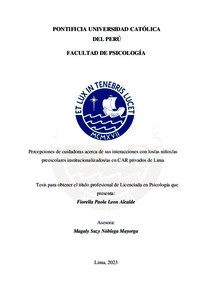| dc.contributor.advisor | Nóblega Mayorga, Magaly Suzy | |
| dc.contributor.author | Leon Alcalde, Fiorella Paola | |
| dc.date.accessioned | 2024-01-24T20:28:15Z | |
| dc.date.available | 2024-01-24T20:28:15Z | |
| dc.date.created | 2023 | |
| dc.date.issued | 2024-01-24 | |
| dc.identifier.uri | http://hdl.handle.net/20.500.12404/26923 | |
| dc.description.abstract | El presente estudio tiene como propósito explorar las interacciones entre cuidadoras
y niños/as preescolares institucionalizados/as de Centros de Acogida Residencial (CAR) de
Lima desde la percepción de las cuidadoras de los/as niños/as. Así, se llevó a cabo una
investigación desde un enfoque cualitativo, y se empleó un diseño de tipo fenomenológico
interpretativo, por medio de la realización de entrevistas semi-estructuradas a 6 cuidadoras
de niños/as preescolares que laboran en 3 CAR privados de Lima. Se identificó que las
interacciones entre las entrevistadas y los/as niños/as están caracterizadas por la
responsividad de las cuidadoras, donde ellas son capaces de percibir sus señales y responder
ante las necesidades de los/as niños/as, educarlos/as e involucrarse en sus actividades, e
incluso los/as niños/as responden positivamente, expresando felicidad y seguridad, ante la
presencia y ayuda de sus cuidadoras. Adicionalmente, las entrevistadas reconocieron las
variables estructurales que estarían favoreciendo las interacciones cuidadora - niños/as y
con ello promoviendo la calidad del cuidado, entre estas, los adecuados ambientes físicos,
el ratio cuidador-niño/a, la asignación al mismo grupo de niños/as, apoyo entre el personal
y la formación de las cuidadoras. Además, estas coexisten con las variables que estarían
dificultando el establecimiento de interacciones entre cuidadoras y niños/as, como la falta
de personal, insuficiencia de materiales y el salario. A pesar de ello y de los retos de su
labor, las entrevistadas refirieron finalmente estar formando vínculos con los/as niños/as
que cuidan. | es_ES |
| dc.description.abstract | The purpose of this study is to explore the interactions between caregivers and
institutionalized preschool children from Residential Childcare Centres (RCC) in Lima
from the perspective of the caregivers. Thus, an investigation was carried out from a
qualitative approach, and an interpretative phenomenological type design was used, through
semi-structured interviews with six preschool caregivers who work in 3 private RCC in
Lima. It was identified that interactions between the interviewees and the children were
characterized by the responsiveness of their caregivers. Caregivers were able to perceive
children’s cues and respond to their needs by getting involved in their activities and
educating them. The children respond positively, expressing happiness and security, in the
presence and help of their caregivers. Additionally, the interviewees recognized the
structural variables that would be favoring caregiver-children interactions and thereby
promoting the quality of care, among these, adequate physical environments, the caregiverchild ratio, assignment to the same group of children, support among the staff and the
training of the caregivers. In addition, these coexist with the variables that would be making
it difficult to establish interactions between caregivers and children, such as lack of
personnel, insufficient materials, and salary. Despite this and the challenges of their work,
the interviewees finally reported that they were forming bonds with the children at their
care. | es_ES |
| dc.language.iso | spa | es_ES |
| dc.publisher | Pontificia Universidad Católica del Perú | es_ES |
| dc.rights | info:eu-repo/semantics/openAccess | es_ES |
| dc.rights.uri | http://creativecommons.org/licenses/by/2.5/pe/ | * |
| dc.subject | Niños abandonados--Investigaciones | es_ES |
| dc.subject | Interacción social en niños | es_ES |
| dc.subject | Cuidadores | es_ES |
| dc.title | Percepciones de cuidadoras acerca de sus interacciones con los/as niños/as preescolares institucionalizados/as en CAR privados de Lima | es_ES |
| dc.type | info:eu-repo/semantics/bachelorThesis | es_ES |
| thesis.degree.name | Licenciado en Psicología | es_ES |
| thesis.degree.level | Título Profesional | es_ES |
| thesis.degree.grantor | Pontificia Universidad Católica del Perú. Facultad de Psicología | es_ES |
| thesis.degree.discipline | Psicología | es_ES |
| renati.advisor.dni | 09823932 | |
| renati.advisor.orcid | https://orcid.org/0000-0001-6572-813X | es_ES |
| renati.author.dni | 72180190 | |
| renati.discipline | 313016 | es_ES |
| renati.juror | Nóblega Mayorga, Magaly Suzy | es_ES |
| renati.juror | Velázquez Castro, Tesania Eva | es_ES |
| renati.juror | Fourment Sifuentes, Katherine Gretel | es_ES |
| renati.level | https://purl.org/pe-repo/renati/level#tituloProfesional | es_ES |
| renati.type | https://purl.org/pe-repo/renati/type#tesis | es_ES |
| dc.publisher.country | PE | es_ES |
| dc.subject.ocde | https://purl.org/pe-repo/ocde/ford#5.01.00 | es_ES |







